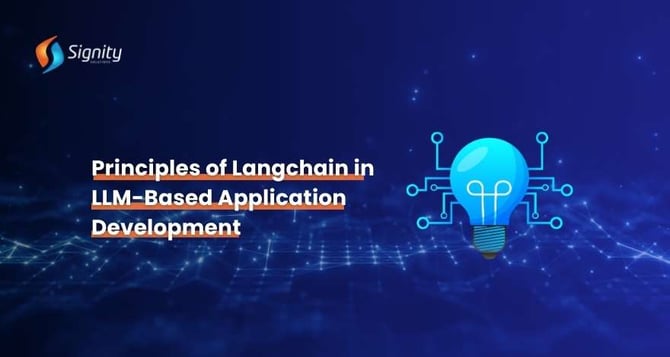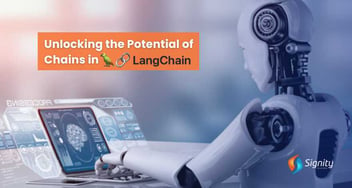Principles of Langchain in LLM-Based Application Development
Discover how Langchain principles revolutionize LLM-based app development, emphasizing modular architecture, data diversity, continual learning, and ethical AI practices. Harness our expertise to integrate these principles seamlessly, ensuring impactful and ethical AI solutions.

Introduction
The emergence of Large Language Models (LLMs) has revolutionized the landscape of artificial intelligence, empowering developers to build applications with unprecedented levels of natural language processing and generation.
Among these advancements, Langchain stands out as a powerful framework that embodies principles crucial for harnessing the full potential of LLMs in application development.
In this article, we'll delve into the fundamental principles of Langchain and explore how they drive innovation in LLM-based application development, accompanied by technical code implementations.
Understanding Langchain
Langchain encapsulates a set of principles and best practices designed to maximize the effectiveness and efficiency of LLM-based application development.
-
Modular Architecture: Langchain promotes a modular architecture, where different components of the application, such as data preprocessing, model integration, and post-processing, are encapsulated into distinct modules. This modular design fosters scalability, maintainability, and reusability of code.
-
Data Diversity and Quality: Langchain emphasizes the importance of diverse and high-quality data for training LLMs. Developers should curate datasets that cover a wide range of topics, domains, and linguistic nuances to ensure the robustness and generalization of the models.
-
Continual Learning: Langchain advocates for continual learning, where LLMs are continuously updated and fine-tuned based on new data and user interactions. This iterative process improves model performance over time and enables adaptation to evolving user needs and preferences.
-
Ethical AI Practices: Langchain prioritizes ethical AI practices, ensuring that LLM-based applications adhere to principles of fairness, transparency, and accountability. Developers should mitigate biases, protect user privacy, and provide transparent explanations for model predictions.
Technical Implementation
Let's illustrate these principles through a technical code implementation using Python and the Hugging Face Transformers library, a popular framework for working with LLMs:
|
|
In this code snippet, we use the Hugging Face Transformers library to create a text generation pipeline using the GPT-2 model. We define an input prompt and generate text based on that prompt. Adjustments to parameters such as max_length and temperature can control the length and creativity of the generated text, respectively.
How Our Company Can Help
We are a leading generative AI development company that specializes in implementing Langchain principles in LLM-based application development. Our team of experienced ChatGPT developers ensures the integration of modular architecture, data diversity, continual learning, and ethical AI practices into your projects. By leveraging our expertise, you can unlock the full potential of LLMs and deliver innovative solutions that enhance user experiences and drive positive societal impact.
Tap into a $5 Billion Market with Our Solutions
The market for AI solutions is projected to reach $5 billion by 2025. Explore our services in ChatGPT development and generative AI to tap into this lucrative market.
Conclusion
Langchain offers a guiding framework for developers embarking on LLM-based application development, facilitating the creation of robust, scalable, and ethically sound applications.
By adhering to the principles of modular architecture, data diversity, continual learning, and ethical AI practices, developers can unlock the full potential of LLMs and deliver innovative solutions that enhance user experiences and drive positive societal impact.
As LLM technology continues to evolve, adherence to Langchain principles will remain paramount in shaping the future of AI-powered applications.


%201-1.webp?width=148&height=74&name=our%20work%20(2)%201-1.webp)


.png?width=344&height=101&name=Mask%20group%20(5).png)


















